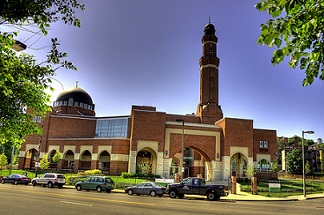Sunday, July 15, 2012

advertisements
CAIRO – A Boston mosque has launched a new initiative to encourage young Somali teenagers to avoid problems in the street life and draw them to mosques to spread awareness among American Muslims about the problem for gangs and drugs."It really woke people up that some of our kids were getting involved with this kind of stuff," said Suhaib Webb, an Oklahoma-born imam of the Islamic Society of Boston Cultural Center (ISBCC), told The Christian Century.
The ISBCC initiative was introduced six months ago after the mosque hired imam Webb.
It was first suggested by Faduma Farah, who came to the United States from Mogadishu, the Somali capital, in 1993.
As a teenager in Boston, Farah often skipped school to smoke cigarettes and marijuana with friends and knew Somalis who ended up in jail, in gangs, or getting sent back to Somalia by frustrated families.
"I used to be the kind of girl that would party and say I'll change when I get married," said Farah, 26, who is still single but became religious a few years ago.
Working as a volunteer as the mosque’s café, she told imam Webb about the problems engaging young Muslim immigrants, especially Somalis who are affected by growing up in a war-torn country, unwittingly placed in crime-ridden neighborhoods or unemployment.
Getting Webb’s approval, Farah tried to convince young Somalis to come to the mosque to meet imam Webb. They told Farah they would only listen to Webb if he came to them.
Therefore Webb, Farah and Malika Rushdan, director of relief services for the Boston chapter of the Islamic Circle of North America, started meeting a group of Somali youth who often could be found getting involved in drug problems.
Webb and told them about his past life, and that he didn't care if they drank or smoked marijuana, that was between them and God. He only asked that they come to the mosque to pray—and that they come sober.
"They liked him from the first day. They were like, 'whoa, he's a gangster,'" Farah said.
After a few meetings the Somalis started meeting at the mosque, although they talked more about sports and school than about religion.
Challenges
Moved by high hopes, the road was not easy for the Islamic Society of Boston Cultural Center.
As the center succeeded in attracting Somali youth, judgmental adults pushed them away, criticizing how they dressed or asking if they had come to steal something
“It was hard to get them to come here, and now you have these guys calling them names and telling them they're losers,” Farah said.
“That just makes them run away from the masjid.”
Confronting the offending adults, Webb responded with a Friday sermon about not judging others.
He repeated stories about how Islam's Prophet Muhammad (peace and blessings be upon him) showed compassion to drunks and other sinners.
"As religious leaders, we need to explain to the older generation that these are young people navigating a lot of difficult challenges," said Webb.
"The tears of the sinner can be more valuable than the arrogant smile of the pious. People need to appreciate the struggles of the sinner."
After six months, the fruits of the mosque program appeared in people like Abdi Mohamed, whose parents died before he was old enough to remember them.
Raised in northern Somalia by his maternal grandparents, he joined relatives in Boston in 2006 when he was 14.
He finished his first year at Bunker Hill Community College in June, and eventually hopes to transfer to a Massachusetts state college to pursue a business degree.
"When I came here, I had no idea. I spoke no English. Now I'm in college. I'm very proud of myself," said Mohamed.
Mohamed said he never got into fights or had a problem making friends. Still, he understands how problems happen.
"It's hard to avoid. Everywhere you go, they are there. School, basketball court, the neighborhood,” he said.
The mosque leaders hope to continue their program to encourage Somali youth to stay off the street.
"It's a process. We have to keep showing up," Rushdan said.
“We have to show them that we're committed.”